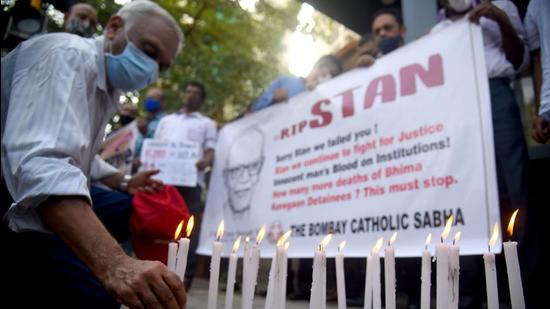For undertrials in India, the fight for liberty
Stan Swamy’s case is symptomatic of a larger problem: Keeping undertrial prisoners (UTPs) in jail by default. The National Crime Records Bureau’s Prison Statistics Report 2019 shows that UTPs comprise 69.05% of all inmates of India’s prisons
On July 5, 84-year-old Stan Swamy died in hospital, far from his home and the community he tirelessly worked for. For eight months, he had suffered slowly in jail. Visibly unwell and battling Parkinson’s, he had requested the Bombay High Court (HC) to allow him to go home to “be with my own”. He was not yet charged with, let alone convicted of, any crime — only accused of having vague links to a terrorist conspiracy. Still, he was repeatedly denied bail until the inevitable came to pass.

Judges may claim they are helpless before the high standards for bail under the anti-terror Unlawful Activities (Prevention) Act, or UAPA. However, while Section 43D(5) of UAPA and the Supreme Court (SC)’s added restrictions in NIA v Zahoor Watali are constraints, they are not blanket prohibitions. The SC has held that bail can be granted when delays defeat the constitutional right to a speedy trial in Union of India v KA Najeeb. Bail can also then be granted when continued incarceration would render life itself meaningless, as in the case of Swamy.
His case is symptomatic of a larger problem in the criminal justice system: Keeping undertrial prisoners (UTPs) in jail by default. The National Crime Records Bureau’s Prison Statistics Report 2019 shows that UTPs comprise 69.05% of all inmates of India’s prisons. In 2018, it was 69.41%, and in 2017, it was 68.49%. Thirteen per cent are over the age of 50. This, despite prison occupancy averaging 118% nationally (174.9% in Delhi).
Part of the problem is that courts have wide discretion to deny bail in a majority of offences. Discretion leads to a cautionary approach and a tendency to rely upon the State’s version of events. The higher courts need to lead by example and encourage greater scrutiny of the prosecution case in the early stages. The presumption of innocence needs revival.
A recent example from Uttar Pradesh shows how far we have to go. On March 31, a man was arrested for being part of an auto theft gang. The district court denied bail because the police claimed he was a dreaded criminal, previously booked at the Akbarabad Police Station in a Gangster Act case (which is another stringent law). Before the HC on June 25, the State’s counsel (additional government advocate or AGA) restated this accusation. On July 2, however, the HC recorded that there was no police station of Akbarabad, and the “AGA does not dispute this fact”.
This is an extreme case of disregard for the Constitution, which states clearly that no person shall be deprived of his life or personal liberty except according to procedure established by law.
At every level of the system, there was a failure of duty in this case: Failure by the police in deliberately invoking a non-existent case under a draconian law; failure by the district court in accepting the State’s word as the gospel without verification of records (such mechanical orders reduce the power to imprison to some more menial task); failure by AGA, who may represent the State, but is first an officer of the court and must not encourage illegal custody based on fabrications.
And it was also, with all respect, a failure of the HC. Even in this extreme case, it did not grant the man immediate release on July 2 despite recording the falsity of the prosecution case, nor has it directed compensation for his suffering. He was released on July 8 — a full week spent in jail after the error was discovered, and over three months in total. The HC rightly called for an explanation from the errant officers and said that action should be taken against them.
However, the man could have been released on interim bail, which exists so that undertrial prisoners do not have to wait for days while the court completes formalities, or waste away in jail while undergoing years-long trials.
Recall the SC’s exhortation in the Arnab Goswami case that “deprivation of liberty even for a single day is one day too many”. The courts must uphold this principle uniformly in every case, before it is too late.
Shruti Narayan is a Delhi-based lawyer and a member of the Women in Criminal Law Association
The views expressed are personal



